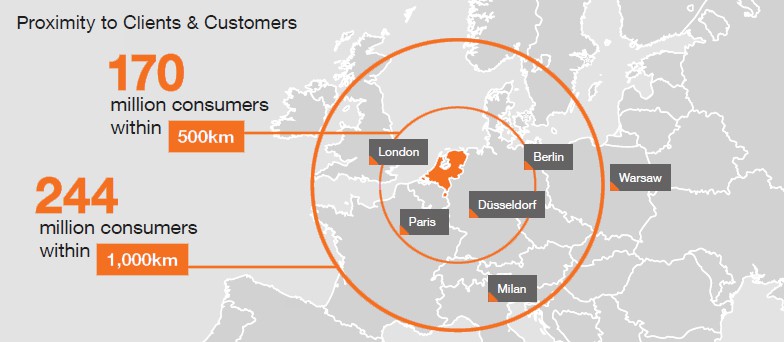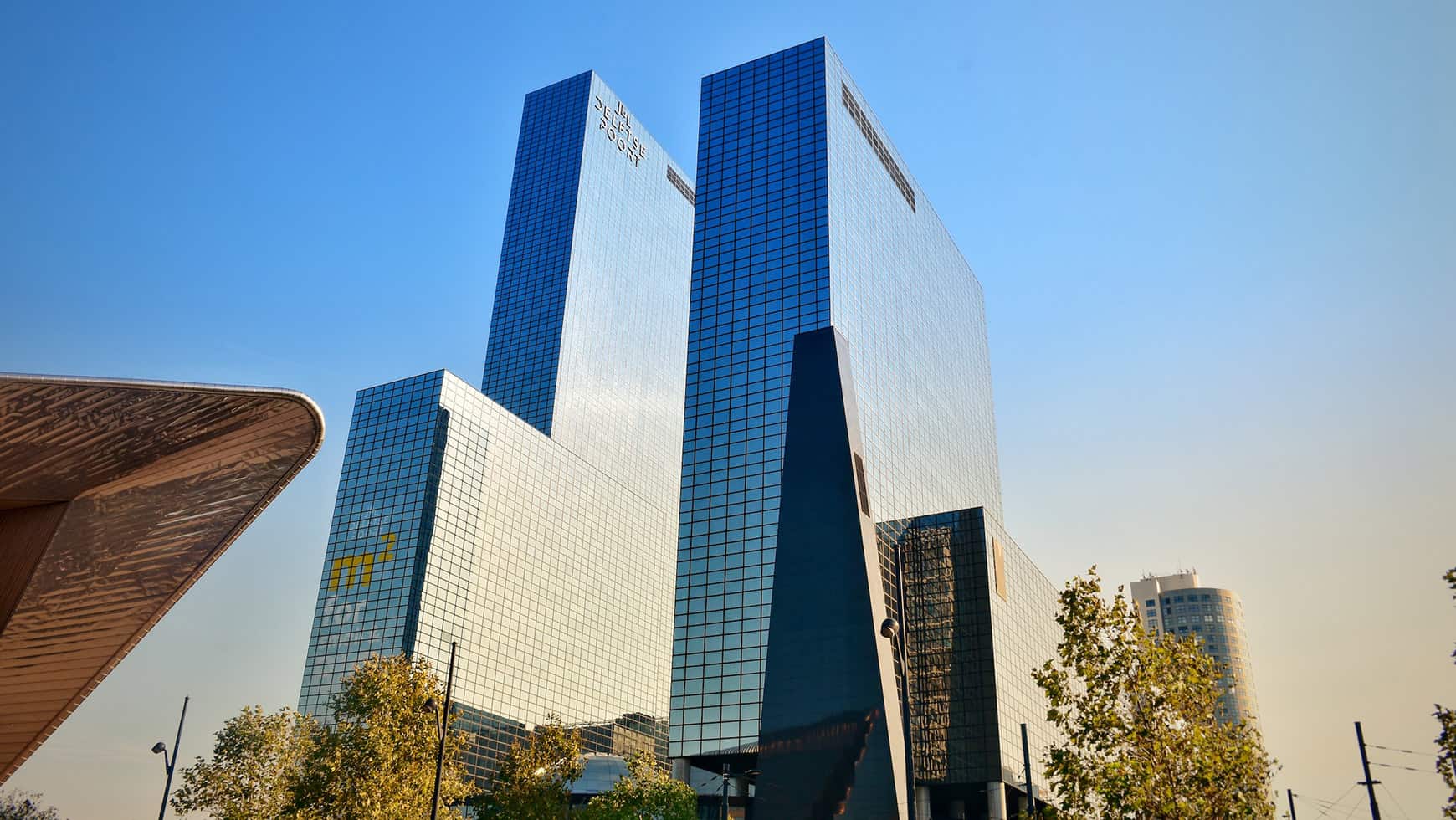10 Benefits of Doing Business in the Netherlands
Are you considering setting up a business or expanding your business to the Netherlands? There are several benefits of doing business in the Netherlands, a country known for its open trade culture and hospitality to foreign entrepreneurs.
1. Strategic location
The Netherlands has a strategically advantageous position in mainland Europe. It is highly accessible via sea, land and air, making it suitable for international expansion.
From Amsterdam and Rotterdam, the country’s major transport hubs, companies have access to 95% of Europe within 24 hours.
Rotterdam is home to the largest port in Europe and outside of Asia, and processes over 460m tonnes of cargo each year. Amsterdam is the fourth largest European port, processing 100m tonnes of cargo annually.
Aviation-wise, Amsterdam Airport Schiphol is the third busiest airport in Europe. It is an international transit hub for passengers and cargo alike.

2. Stable economy
The Dutch economy has been stable for decades and continuously sees steady growth. The country is noted for reliable industrial relations, low unemployment, a large talent pool, and stable public finances.
Despite its size, the Netherlands was the world’s number 6 in exports and the 8th largest importer of goods in 2020.
Additionally, the Netherlands is a stable core member of the EU.
3. Easiness of starting a business
The Netherlands ranks as one of the easiest European countries to start a company. There is an advanced online system to register a company and the process can be completed in a matter of days.
Setting up a business bank account is mandatory when opening a Dutch business. The bank account can be with a Dutch bank or another bank in the Single Euro Payments Area (SEPA; EU member states plus Iceland, Liechtenstein, Switzerland and Norway). Opening a local business bank account without a Dutch passport may pose a challenge – our professionals can help.
4. Favourable taxation
One of the main benefits of doing business in the Netherlands is the Dutch taxation system, which favours foreign direct investments. Business will be taxed on the generated profits.
There are two taxable income brackets, a lower rate of 15% applies to the first income bracket. The standard corporate income tax (CIT) tax rate is currently set at 25.8% as of 1 January 2022.
The first income bracket consists of taxable income up to EUR 395,000 and the excess will be taxed according to the standard CIT rate. It has been proposed to lower the first income bracket to EUR 200,000 per 1 January 2023.
Here is a look at corporate income tax rates of neighbouring countries:
| Country | Corporate income tax rate |
| France | 33.33-36.6% |
| Germany | 23-33% |
| Luxembourg | 29-30% |
| Belgium | 29% |
| Netherlands | 15-25.8% |
A plus point of the Dutch tax system is the participation exemption, a measure that prevents double taxation of company profits. Furthermore, a concern can be split into several limited companies to reduce the average tax rate.
The Netherlands has a tax treaty with more than 80 countries.
5. Innovation
The Dutch government is a major advocate of technological innovation and public-private partnerships. There is a good framework to provide companies with the necessary support to foster innovation and business expansion.
The Netherlands ranks 6th on the Global Innovation Index 2021, scoring even higher on sub-rankings in ICT infrastructure (4th) and knowledge absorption (2nd).
Engaging in R&D activities is actively promoted by the government through the corporate tax structure and specific R&D tax incentives to stimulate innovation.
The Netherlands houses a large number of innovative and knowledge-intensive companies and universities with a world-class reputation. It includes the best agricultural university and research institution (Wageningen University) and Brainport Eindhoven, Europe’s most innovative technology region.
6. Strong financial centre
Traditionally, the Netherlands has been a desirable place for major financial institutions. The financial sector plays a major part in the Dutch economy and Dutch banks are world-famous (ING, ABN Amro, Rabobank).
The Dutch government has modern legislation for financial oversight, which has created a well-developed financial sector. However, securing credit can be challenging due to the absence of a public registry coverage.
7. Infrastructure
The Netherlands has a superior logistic and technology infrastructure. The DHL Global Connectedness Index has ranked the Netherlands as the world’s most connected country since 2005, praising its deep integration of global trade and links to many countries.
Besides world-class seaports and airports, there is an extensive network of roads, rail and waterways. These are characterised by their great condition and clear navigation. Companies can reach 170 million consumers within 24 hours by rail, road or water from Amsterdam and Rotterdam.
Additionally, the Dutch telecommunications network ranks among the world’s best for quality, speed and reliability. Most transatlantic sea cables between continental Europe and North America go directly to the Netherlands.
The country has one of the highest broadband penetrations per capita in the world, one of the world’s fastest average broadband speeds and 99% 4G coverage.

8. Many different strong sectors
The Netherlands offers great prospects to either start a business or invest in an already existing company. Certain sectors even stand out in this regard, as the Dutch are world-famous for their pioneering, efficient and innovative solutions.
Top sectors are:
- Information & Technology
- Logistics
- Health
- Creative & Arts
- Renewable & Offshore energy
- High-tech systems & innovations
- Agriculture & Food processing
- Pharmaceutical & Chemical
- Financial services
- Electrical engineering and machinery
- Telecommunications
9. Large talent pool
The Dutch workforce is highly skilled and educated, productive, flexible and multilingual.
The higher education system in the Netherlands ranks among the top 10 in the world. The country ranks first out of 112 countries on the EF English Proficiency Index 2021. Besides English, a high percentage of the Dutch population also speaks German and/or French.
According to the OECD Skills Outlook reports, the Netherlands has one of the highest shares of individuals with well-rounded cognitive (literacy, numeracy and problem-solving) skills and is ahead in the digital transformation of the workplace, thanks to a commitment to IT investment.
The Netherlands is also home to many foreign workers and offers a ‘Highly Skilled Migrant Visa’, allowing companies to bring highly qualified expats to their Dutch company.
10. Tax incentives
The Dutch tax system has several tax incentives to stimulate innovation and business activities.
R&D incentives
There is a reduction of wage tax available for wages of employees engaged in R&D of technologically new products.
R&D costs can be reduced by using the scheme to reduce the payroll tax and national insurance contributions to be remitted, called the ‘Wet bevordering speur- en ontwikkelingswerk’ (WBSO).
The WBSO rebate covers salary costs and other expenses related to R&D. For 2022, the regular reduction of payroll tax and social security contributions is 32% of the first EUR 350,000 and 16% for the excess R&D costs.
The budget for this subsidy is fixed, so the amount is subject to budget availability.
Investment incentives
Investments in certain business assets (e.g. machines, inventory, computers) may qualify for an additional deduction for (corporate) income tax purposes, to be claimed as part of the tax return.
The additional deduction is 28% of the investment amount if the qualifying investment falls between EUR 2,300 – 55,745. Qualifying investments between EUR 55,745 – 103,231 have a fixed allowance of EUR 15,609. Above EUR 103,231, the allowance decreases to nil when the investments are more than EUR 309,693.
Energy-efficient and environment-improving assets
Investments in energy-efficient assets may receive an additional investment allowance (EIA), to be claimed via a deduction in the (corporate) tax income return.
The minimum investment amount per asset is EUR 2,500 and must satisfy the requirements of the Energy List 2022, published by the Netherlands Enterprise Agency (RVO). The EIA amounts to 45.5% of the qualifying investment.
A similar tax incentive is available for environment-improving assets, which falls under the Environmental investment deduction (MIA), set at 45, 36 and 27%, depending upon eligibility.
How HKWJ can help with doing business in the Netherlands
As an international company with offices both in Hong Kong and the Netherlands, HKWJ Group can be your first point of contact and provide a wide arrange of services to get your business up and running, such as:
- Advise you on the different legal entity forms through which you can do business in the Netherlands
- Assist with the incorporation of a legal entity or with setting up a branch or partnership
- Advise on the corporate governance structure
- Register your company with the trade register
- Draft (intra-group) contractual agreements
- Assist with annual compliance requirements
- Provide tax advice and inform of relevant tax incentives
- File (corporate) income tax returns
Feel free to get in touch with us via the form below.






